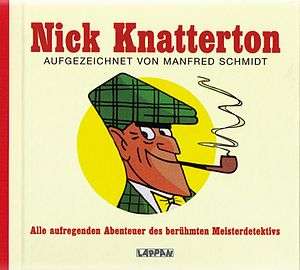Nick Knatterton

Nick Knatterton is the name of a West German comic strip and the name of its main character, a private detective. The strip was drawn by Manfred Schmidt (1913–1999) from 1950 to 1959.
It was initially released in the German magazine Quick.[1]
The visual style of the comics is cartoony, but still realistic enough for the comic to be taken as a (at least mostly) serious detective comic. It is characterised by its unique style of humour, most of which derives from allusions to current political affairs in the Federal Republic of Germany of the 1950s.[1]
Character
The name Nick Knatterton is alluding to Nick Carter and Nat Pinkerton. Hist full name is Nikolaus Kuno Freiherr von Knatter. He was born in Kyritz (also called "Kyritz an der Knatter") to Casimir Kuno von Knatter and Corinna Pimpsberg.[2]
Knatterton always dresses in a Sherlock Holmes-style green plaid overcoat and cap, and smokes a pipe.
He is presented as the embodiment of a competent and effective private detective. He is not extraordinarily physically strong (although he keeps in good shape) and does not possess many fancy gadgets, but his mental capabilities, such as his power of deduction, his senses, his memory and knowledge of various topics, are incredibly good, to the point of caricature. As an example, Knatterton was once able to pinpoint his location after being thrown tied and blindfolded into the back of a van, thanks to memorising the entire map of the city and feeling the van's momentum with his body when turning corners.
Plots
Knatterton's cases often involve wealthy aristocratic families with a public image to maintain. Many of the villains are recurring characters and acquainted with Knatterton and his clients, and they're usually good at heart, make up with their victims after being arrested, and everyone is happy at the end.
Female characters are often drawn as bombshells.[1]
A recurring location in the stories is the Alibi Bar, a bar favoured by various shady characters. The handles on the bar's front door are shaped like section signs ("§"). In many stories, Knatterton has found out the real situation and been able to complete his deductions when visiting the Alibi Bar, where he sometimes finds a wealthy family's teenage daughter and the man who stole her jewelry wrapped up in each other's arms.
TV series
Nick Knatterton's adventures were translated into many languages, and a television cartoon series was produced in 1979 by the creator's own studio. All 15 episodes of the show are available on DVD in Germany. The show is narrated, with the narrator being in fact the only voice actor. Characters merely squeak when they are shown talking, and the narrator then explains what was said. Knatterton himself often voices out the conclusions of his deductions by saying "Conclusion" (German: "(Ich) kombiniere!", literally: "I'm concluding!"), followed by the conclusion itself.[1][2] This has become a kind of catchphrase for him.
Films
The comic has been adapted into two films:
Radio dramas
2007 and 2008 German based Der Audio Verlag published Nick Knatterton radio dramas in German.
- Nick Knatterton – Der indische Diamantenkoffer (March 2007)
- Nick Knatterton – Der Schuß in den künstlichen Hinterkopf (March 2007)
- Nick Knatterton – Die Million im Eimer / Das Geheimnis hinterm Bullauge (February 2008)
- Nick Knatterton – Die Erbschaft in der Krawatte (February 2008)
Notes and references
- 1 2 3 4 Schneider, Matthias (March 2005). "Deutschsprachige Comics". Chaos und skurille Figuren – Manfred Schmidt (in German). Goethe-Institut Stockholm. Retrieved 8 March 2016.
- 1 2 Schmidt, Manfred (2007). Nick Knatterton: Alle aufregenden Abenteuer des berühmten Meisterdetektivs (in German). Oldenburg, Germany: Lappan Verlag. ISBN 978-3-8303-3152-0.
Further reading
- Gråsten, Johanna 1995: Sprachspiele in »Nick Knatterton« von Manfred Schmidt und seiner finnischen Übersetzung »Nikke Knatterton«. Pro gradu. Joensuu University.
- Sackmann, Eckart 2013: Oh, Nick Knatterton: Das Leben des berühmten Meisterdetektivs ausgespäht von Eckart Sackmann. Hildesheim: Comicplus. ISBN 978-3-89474-234-8